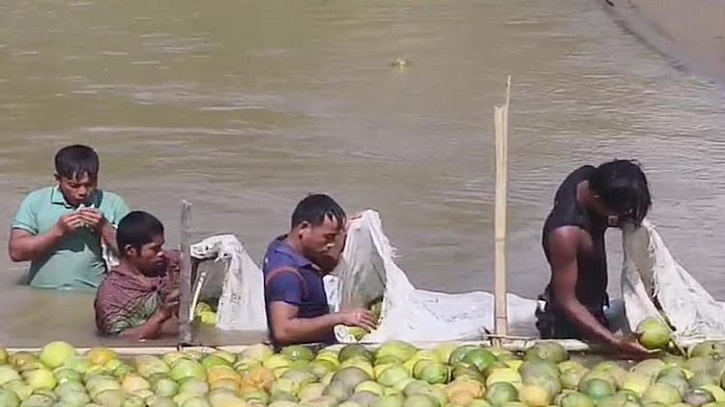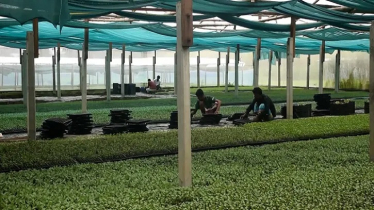
Since the dawn of civilization, humans have relied on nature’s resources to survive and adapt—developing techniques that laid the foundation for practical science and everyday management. One such remarkable example can be found in the hilly regions of Bangladesh, where local farmers have ingeniously turned to nature for help in transporting one of their prized seasonal fruits—the pomelo.
It is now the peak season for hill-grown pomelos, a juicy and delicious fruit cherished by both hill and plain dwellers alike. However, collecting these fruits from hill orchards and transporting them to markets is far from easy. To overcome this challenge, hill farmers have adopted an age-old yet efficient method: floating the pomelos downstream through hill rivers and streams.
A visit to different areas of Khagrachhari reveals a striking scene—hundreds of pomelos floating on rivers and creeks. At first glance, one might think the fruits have fallen and are rotting in the water, but the reality is quite the opposite. This is the season of “floating pomelos,” a unique practice seen across Khagrachhari and Rangamati. After harvesting the fruits, farmers release them into the flowing water, where they drift naturally until they are collected at designated points. There, the pomelos are caught in bamboo enclosures, sorted, and prepared for distribution across the country.
Farmer Asit Boron Chakma told BSS that transporting fruits through hilly dirt roads is costly and difficult, but floating them downstream significantly reduces expenses. The current carries the pomelos close to the main roads, minimizing transportation costs and fruit damage. “When pomelos float in water, it also becomes easier to identify spoiled ones, making sorting much simpler,” he added.
Another farmer, Kalayon Chakma, said their profits have increased thanks to this natural transport method. “We can now send our fruits to distant markets without spending extra on transportation. Every day, hundreds of pomelos drift through hill rivers and streams before being sent to different parts of the country. These pomelos are large, juicy, and full of flavor, which is attracting growing interest among buyers,” he said.
Local trader Md. Rois Uddin noted that demand for these hill-grown pomelos has surged in markets across Dhaka and other cities. “Pomelo is one of the major fruits cultivated in the hill regions. These trees grow naturally without chemical fertilizers or pesticides, making the fruits healthy and safe to consume. Their popularity is increasing day by day,” he said.
Nur Mohammad Rasul, Sub-Assistant Agriculture Officer in Mahalchhari, told BSS that the soil and climate of the hill tracts are highly suitable for pomelo cultivation. “Farmers are saving costs by using natural methods of transportation, which is very positive. These pomelos are large, delicious, and chemical-free, making them highly sought after in the market. We are also providing technical support to help farmers modernize cultivation and marketing,” he said.
He added that the sight of floating pomelos represents more than just natural beauty—it symbolizes the intelligence and resilience of the hill farmers. By harnessing the flow of water to reduce transport costs and reach markets nationwide, these farmers are opening new economic opportunities for their communities while preserving harmony with nature.





